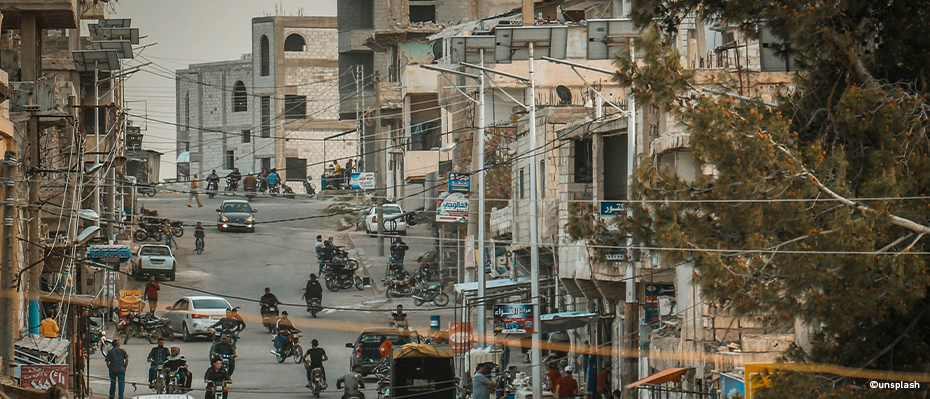As Syria’s new Constitution is drafted, what might this mean for Christians?
Syria’s new interim president has promised an inclusive government until free and fair elections can be held. But elements of the new Constitution are causing alarm.

It is time for ‘a new history for Syria’, according to Syria’s Interim President, Ahmed al-Sharaa.
Three months after his Islamist group overthrew previous president Bashar al-Assad, he has signed a constitutional declaration which, he says, ‘will replace oppression with justice.’ The former leader of an al-Qaeda group, Ahmed al-Sharaa has spoken the language of peace, promising an inclusive government until free and fair elections can be held.
But he – and his new Constitution – face criticism. Unveiled just days after the horrific mass killings of minority Alawites, the new Constitution is now being examined for clues as to what Syria’s future might hold.
Powerful presidency
The new Constitution grants sweeping powers to the Presidency. The Interim President will serve as head of the armed forces, propose laws, and appoint officials answerable only to him. Under Constitution Article 24, two-thirds of the People’s Assembly members will be chosen by a committee appointed by the President. The remaining third will be chosen directly by the President.
The President has the right to veto legislation – the Assembly may override this veto. Given Syria’s political fragmentation, and the large number of political appointees in the Assembly, a coalition rising up against the President is unlikely.
Article 47 of the Constitution gives the President sole powers to appoint all seven judges of the Higher Constitutional Court.
The lack of clear safeguards ensuring judicial and parliamentary independence is now prompting warnings of a concentration of power in the executive.
Islamic law takes centre stage
“Islamic jurisprudence is the principal source of legislation,” Article 3 declares.
Syria’s previous Constitution held Islamic law was simply ‘a main source’ of new legislation – that is, one of several sources. The shift to becoming ‘the principal source’ gives Islamic law a new weight in Syria’s legal system.
What was previously symbolic language is now the dominant legal framework for Syria’s future.
Minorities vulnerable
Syria is still shaken by the mass killings of Alawite men and boys in the coastal north west, which occurred while the Constitution was still being drafted.
Armed gunmen went house to house, killing men and boys of the minority Alawite sect in Latakia and Tartous, according to the Syrian Observatory of Human Rights. Some were thought to be old regime loyalists; hundreds more were civilians.
Ethnic and religious minorities – whether Christians, Druze, Yazidis, Kurds, Ismailis, Alawites or others – are now living in a state of fear.
While the Constitution does promise freedom of religious belief, only ‘recognised heavenly religions’ are to be protected. As for ethnic minorities – there is no explicit protection for them.
The government’s defenders say the Constitution incorporates all international treaties and protocols which Syria is a signatory to – and, through those, religious freedoms and protections for all minorities are embedded in the document.
The lack of clarity has prompted Syrian Kurdish leaders to speak out, saying it ‘contradicts the reality of Syria and its diversity’.
Competing visions for women
For women, the Constitution seems to speak with a divided voice. It bans sex discrimination and promises the right to education and rights in the workplace for women – features which have been warmly welcomed.
However, it also emphasises the importance of ‘dignity’ for women, and a woman’s ‘role inside the family and society’, statements that could potentially conflict with rights in the workplace. The Syrian Women’s Council say it displays ‘disregard’ for women. There is no guidance on resolving these potential tensions.
‘Transitional Constitution’
The Constitution is intended to govern Syria for a temporary period of five years, during which President al-Sharaa will hold extensive powers.
Strikingly, the document says little about how it will be replaced, or who will draft its replacement.
“Despite the rhetoric of tolerance, grave questions are arising from the document,” Matthew Barnes*, Open Doors’ Middle East analyst, notes. “The real test will be whether the government is willing to protect all Syrians, regardless of religious or ethnic background. The mass killings of Alawites in Latakia and Tartous already speak to a different agenda.
“Is Syria truly on a path to democracy – or merely exchanging one form of authoritarianism for another?”
*Name changed for security reasons
- For government officials drafting the new Constitution, that they would truly be an inclusive government
- That God would raise up godly men and women in positions of influence as Syria reforms
- That the Syrian church would continue to be a beacon of hope and source of peace for many as they live out their faith.
Get regular updates and stories from the persecuted church straight to your inbox by subscribing to our weekly and/or monthly emails. You can also sign up for our bi-monthly magazine and prayer diary. We’d love to stay in touch with you to equip you with all you need to come alongside your persecuted family.